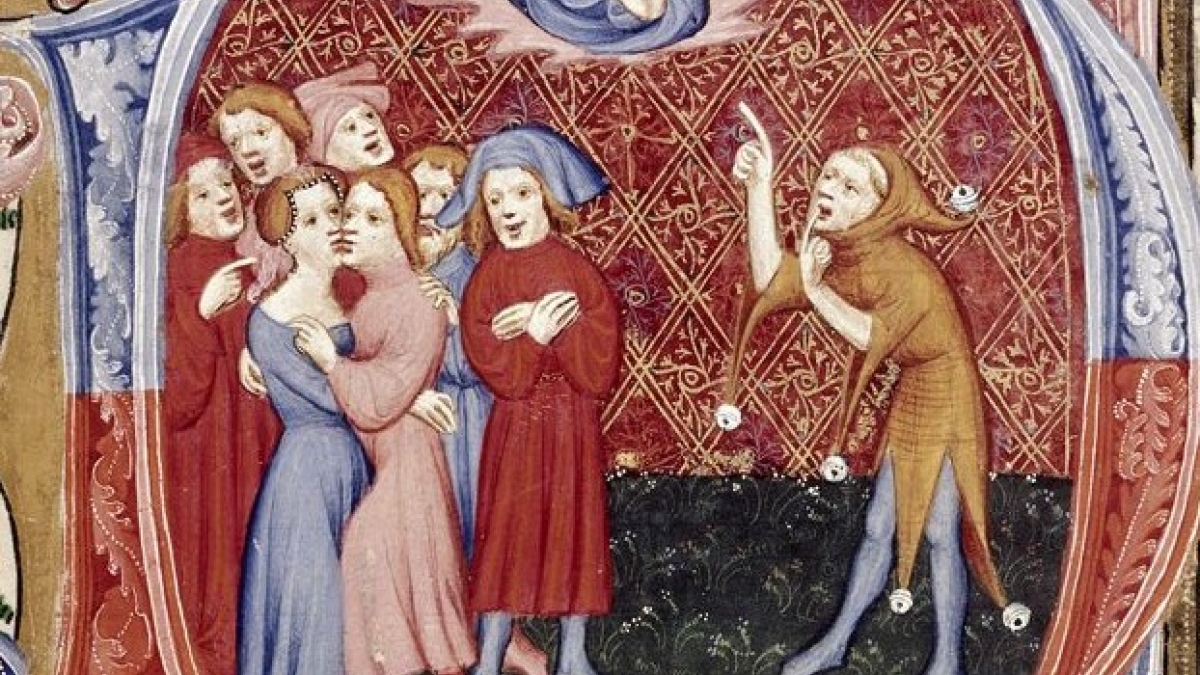Is laughter timeless? ASU Chaucer event celebrates medieval humor

“Chaucer was genuinely funny,” said Richard Newhauser, professor of English at Arizona State University. “There is a range of human experience that makes Chaucer a classic, and it is why he is still being studied after 700 years.”
Newhauser is a co-organizer of the biennial Chaucer Celebration at ASU, this year themed “Chaucerian Comedy and the Senses (of Humor).” The daylong event takes place on Friday, April 18, on ASU’s Tempe campus.
The medieval writer Geoffrey Chaucer (c. 1343-1400), often referred to as the “father of English literature,” was one of the most important English language writers. The choice to celebrate Chaucer each April at ASU is an informed one; the earliest archival mention of his name described an Easter clothing purchase in 1357. Incidentally, the duchess for whom Chaucer worked as a court page bought him a cape, new shoes and pants (one leg red and one leg black) – very fine clothing at the time.
Twenty-first-century audiences can still relate to much of what Chaucer found funny. Chaucer frequently made joking commentary on what was acceptable in society; he even sometimes made fun of himself. In “The Tale of Sir Thopas,” Chaucer’s persona narrates using bad poetry and bad rhyming, and eventually is interrupted by the host in the story with, “this rhyming is so terrible it’s not worth a turd.” Chaucer depicted himself as this unflattering and humble character to comment on the type of literature being parodied in the tale.
Newhauser explained that Chaucer also used humor to remark on people he knew. In the story “Chaucers Wordes unto Adam, His Owne Scriveyn,” for example, Chaucer critiqued his scribe’s copying abilities, or lack thereof, explaining that if the scribe Adam keeps writing things down wrong, he should be cursed with a really bad case of dandruff.
The 2014 Chaucer Celebration includes a roundtable discussion of the new humanities field of sensory studies, which explores how our senses create meaning within culture. According to Newhauser, comedy is also a social act, and we use it to create identity. “Things that we find humorous help define who we are and what groups we can relate to,” he said. Chaucer’s sensory, bodily humor will be the topic of the “Medieval Sensuality and Chaucerian Comedy” roundtable, which takes place from 11 a.m. to 1 p.m. in Hayden Library, room C6A. The session will feature visiting professor and Chaucer expert, John Ganim, from the University of California at Riverside. Refreshments and lunch will be served at the roundtable’s conclusion.
Following this first event will be a concert by the Phoenix Early Music Ensemble, directed by Carolyn Rynex, a doctoral student in the School of Music at ASU. The performance will take place from 1:45 to 2:30 p.m. in room C6A, Hayden Library. The group will perform songs and hymns composed during Chaucer’s time, like “Sumer is icumen in,” which translates to "Summer Has Arrived." The composer of the song is unknown, but the song is a layered, playful arrangement in Middle English, the language in which Chaucer also wrote.
From 2:45 to 3:15 p.m. in Hayden Library, room 210C, will be a hands-on introduction to the Chaucer holdings in ASU Libraries’ Special Collections. The holdings include publications from the 19th through the 21st centuries, such as the Kelmscott Chaucer, an art nouveau print of “The Canterbury Tales.”
From 7 to 8 p.m., in the Durham Language and Literature building, room 316, will be a student-organized roundtable discussion on “Medieval Studies and the Humanities as Ethical Education.” The participants include graduate students from across several disciplines, as well as a book representative from W. W. Norton in a conversation about how to use literature to foster critical debate and ethical reflection in college and high school classrooms.
Arguably the highlight of the 2014 Chaucer Celebration offerings is a showing of the film “Monty Python and the Holy Grail,” from 8 to 10 p.m. that evening, again in the Language and Literature building, room 316. Popcorn will be provided, but you’ll have to bring your own coconuts.
All Chaucer Celebration events are free and open to the public. Sponsors include ASU’s Department of English, Project Humanities, Dean of Humanities in the College of Liberal Arts and Sciences, and Maxine and Jonathan Marshall Chair in Modern and Contemporary Poetry, with ASU Libraries and the Arizona Center for Medieval and Renaissance Studies. For more information, including detailed descriptions of sessions, please visit http://english.clas.asu.edu/chaucer.
Written by Kira Assad